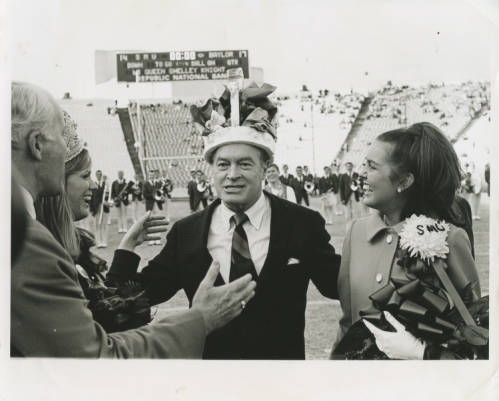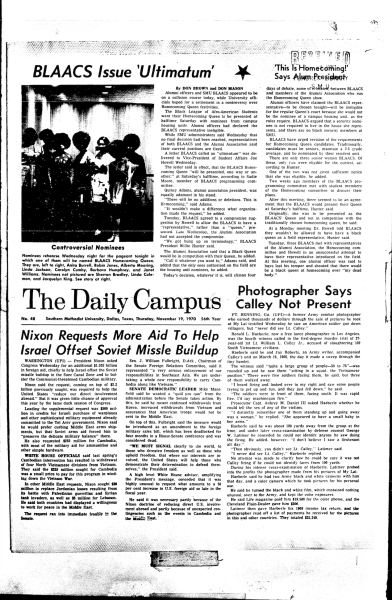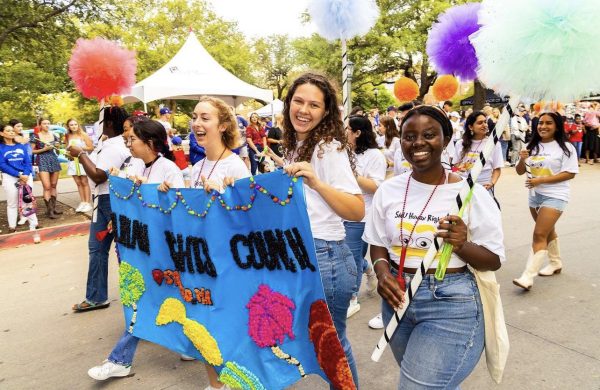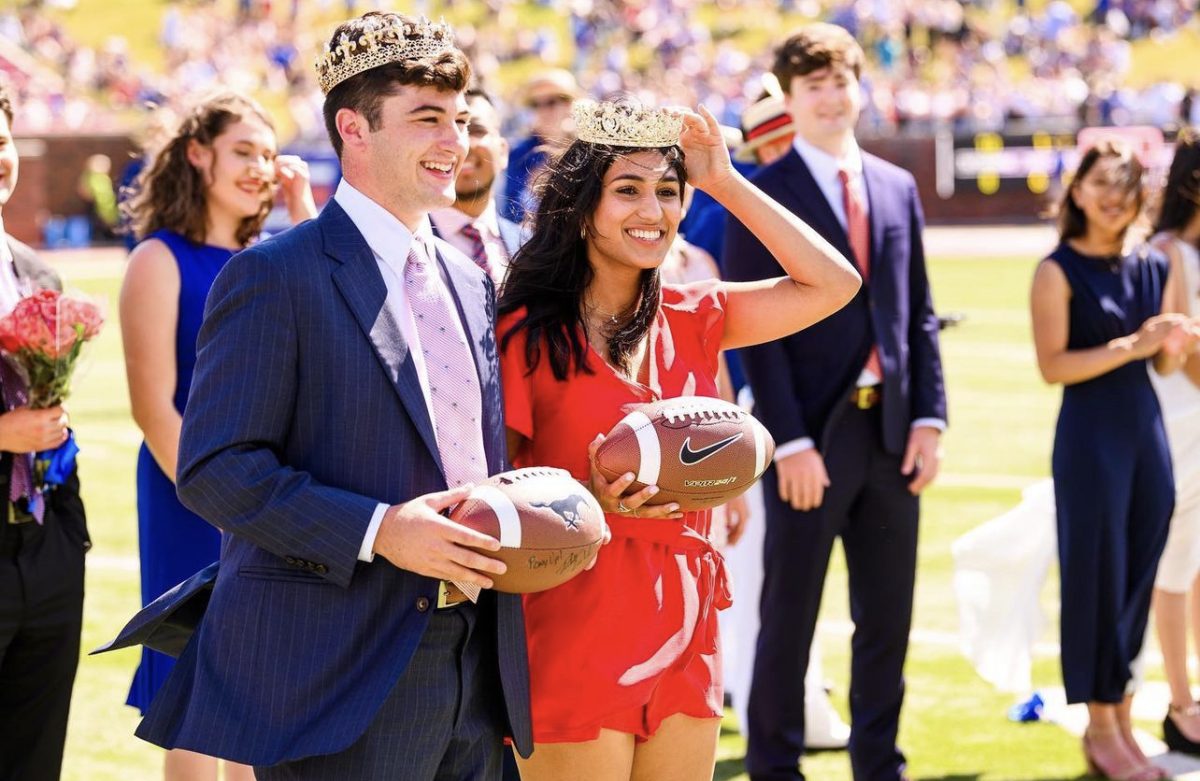On the second floor of Fondren Library, the archived past of Southern Methodist University lies in precisely categorized file folders and neatly labeled boxes. I plopped a giant box labeled “Homecoming” on the table and began to sift through each year, starting in the 1960s all the way to the mid-2010s.
Black and white photos unveiled bright smiles, shiny Homecoming crowns and extravagant floats, sights still familiar. From 1968, a photo shows Bob Hope (yes, that Bob Hope) adorned in his Homecoming King crown as he goes to hug students Shelley Knight and Jill Thrift. Other photos show nominees wearing beautiful dresses and pantsuits, outrageously decorated mums and bejeweled crowns.

But a series of photos, Daily Campus newspapers and excerpts from a book entitled One Hundred Years on the Hilltop show a stark diversion from the outwardly positive aspects of Homecoming.
In 1969, with civil rights politics still impacting the nation, SMU’s Homecoming tradition shifted when Peyton Hall announced Yvonne Clement as their nominee for Homecoming Queen. This made her the first African American nominee in SMU Homecoming history. Though Clement did not win the crown, she was presented alongside the other nominees during the halftime ceremony.
The following year, all 16 nominees were white. As a result, The Black League of Afro-American College Students (BLAACS) tried to nominate one of its members, Jacqueline King, but since she was not a representative of a dorm or sorority, the Alumni Association did not accept King’s nomination. Thanks to a last minute compromise, BLAACS was able to present King as a Homecoming Queen nominee. Between the first and second quarter, King was presented, but the final half of the BLAACS ceremony was interrupted by Baylor’s marching band. When the other candidates were presented at halftime, nearly 30 black students walked out in protest.


After that year, the Alumni Association amended eligibility rules for Homecoming, allowing campus organizations to join sororities and dorm residences in the nomination process. The effects of the amendment remain to this day.
As the social climate of the country continues to evolve, organizations, like the Human Rights Council (HRC), have pushed for other changes in Homecoming. In 2022, SMU’s Homecoming court expanded to include more gender inclusive language. Now, each organization participating in SMU Homecoming can nominate up to two candidates regardless of sex or gender identity. But the road to get there was challenging. Associate Director of the Human Rights Program (HRP), Dr. Brad Klein recalled the long conversations about the council joining Homecoming traditions.
“When [HRP students] were first thinking about becoming part of Homecoming, there was a lot of resistance because there were many individuals in the community who felt like this was not for them,” he said. “Some who identified in the LGBTQ community who just felt like, ‘This doesn’t fit me, it doesn’t fit my identity, it doesn’t fit how I see the world, and I don’t think that I would be welcomed in the process.’”

The HRC first started to push for a gender-inclusive process in 2018 and communicated with Student Foundation, the organization responsible for planning Homecoming. The framework discussed allowed organizations to nominate up to two candidates regardless of sex or gender identity. Each nominee could then choose to be referred to as either King, Queen or Royalty, which would only be used during the announcement of the winners during halftime.
The HRC was under the impression that their plan was accepted and would be put to action. But, the proposed process was reversed two years in a row, leading to a boycott of Homecoming by the Human Rights Council in 2020.
Current co-strategic Director of the Human Rights Council, Guadalupe Roman, said ideas of retaining SMU tradition set back the hope of having a more inclusive blueprint for homecoming.
“Administration was pushing back along the lines of, ‘It’s SMU tradition. We can’t just get rid of tradition, right? How are we not going to have a homecoming queen and king?’” Roman said.
In the Human Rights Council’s open letter published through The Daily Campus, they point to SMU’s Statement of Nondiscrimination: “SMU’s commitment to equal opportunity includes nondiscrimination on the basis of sexual orientation and gender identity and expression.“
Klein urges all members of the university to uphold SMU’s values, even if they seem small in the bigger picture.
“Are we living up to who we say that we are, and if we really want every student to be included, what do we have to do tangibly to make them feel that way?” Klein said. “It may be a small thing in the overall scheme, but it matters, you know, the words matter, structures matter.”
Meredith Hughes, the 2023 Homecoming Chair and a Dallas native, has experienced SMU Homecoming traditions since she was a child. She has watched involvement grow from SMU and the Dallas community at large over the years. She noted that more opportunities for on-campus organizations have allowed for more diversity and inclusiveness in the event.
“Over time, we’ve been pushing for more organizations to become involved in Homecoming, trying to give them more outlets financially and more opportunities in general,” Hughes said.
Roman explained that inclusivity does not take away from the nature of the event, and she encouraged students and faculty to consider the people who are impacted by the exclusive nature of words like “queen” and “king”.
“Ultimately, nothing is really changing. Homecoming is still homecoming,” Roman said.






















